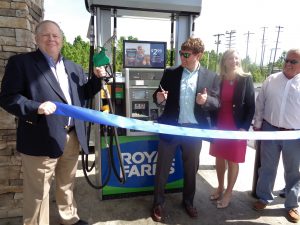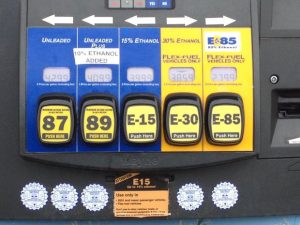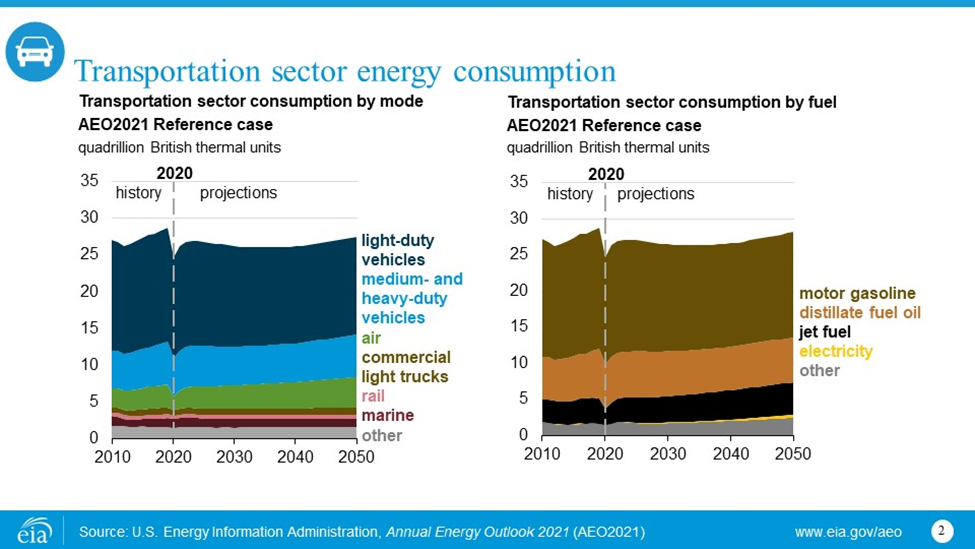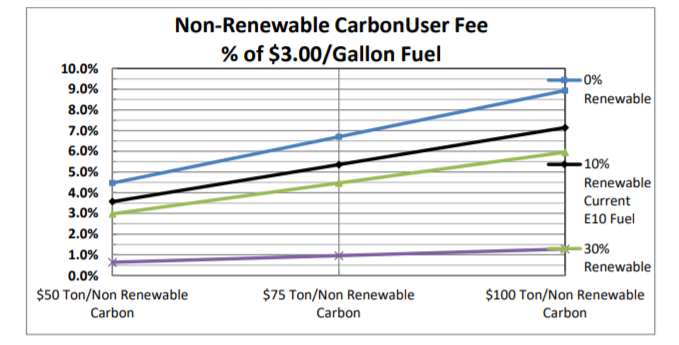by Joanne Ivancic* (Advanced Biofuels USA) First proposed in 2015, Advanced Biofuels USA’s proposal for a “Disappearing” Non-Renewable-Carbon User Fee begins: “If we’re serious about reducing climate change-causing greenhouse gases and reducing non-renewable liquid and gas use, we need serious actions.” And those actions should serve low income, high pollution areas that have suffered environmental injustices.
- Including the price of GHG effects in the pricing of renewable and non-renewable fuels.
- Committing serious money to focused renewable fuel research and infrastructure development.
The simplest and fastest way to accomplishing this is adding a Non-Renewable-Carbon User Fee to the portion of liquid transportation fuels and natural gas made from non-renewable sources.
The fee would be designed to disappear as renewable fuels replace non-renewable ones because only the non-renewable portion would be taxed.
Departing significantly from a number of current legislative proposals, Advanced Biofuels USA proposes that the fees be used to further the replacement of fossil fuels with renewable ones rather than being distributed back to the populace. The intent is that people who need the more affordable, cleaner, less polluting fuel with a smaller carbon footprint would reap those benefits directly. And, by funding research, development and deployment, the pace of replacing fossil fuel with renewables will accelerate.
 Thus, the fees should be used in only two ways.
Thus, the fees should be used in only two ways.
- Renewable Fuel R&D: An immediate Apollo-type program should be funded with between 50% and 60% of the fees. It should be administered by the National Science Foundation (NSF) and be focused on getting non-food biomass fuels and gases into the pipeline in less than seven years. A sustainable renewable fuel industry will not only cut petroleum imports and tremendously reduce US oil and gas extraction damage, but more important, create good jobs in research labs, rural towns, and urban manufacturing plants and converted refineries.
- Renewable Fuel Infrastructure: The upgraded fuel pumps and decentralized processing/distribution modules would be funded with between 40% and 50% of the fees. These programs would be run by the states with funding available via the existing USDA Higher Blends Infrastructure Incentive Program, or HBIIP grant program. States know what the needs are and the most effective ways to address them. Priority should go to low income and high pollution areas, rural and urban, and could include facilitating use of sustainable aviation fuel, as well.
Collection of the Non-Renewable Carbon User Fee
The collection of this user fee would not require new bureaucracies. Existing consumer point-of-sale fuel and utility tax collections systems would be used.
 From left: Maryland Energy Administration's Greg Williams, Royal Farms' Tom Ruszin, Growth Energy's Emily Skor and Maryland Grain Producers' Chip Bowling get ready to cut the ribbon for a new E85 Flex Fuel pump.
From left: Maryland Energy Administration's Greg Williams, Royal Farms' Tom Ruszin, Growth Energy's Emily Skor and Maryland Grain Producers' Chip Bowling get ready to cut the ribbon for a new E85 Flex Fuel pump.
Environmental Justice Considerations: Real, Practical, Visible Benefit to People Who Need It Most.
A tax on the non-renewable portion of gasoline makes transition to less expensive, more renewable fuel a real option. As the proceeds from the tax expand the infrastructure (pumps, engine design/production) to optimize availability and use of greater portions of ethanol, biodiesel, renewable diesel, renewable natural gas or other components in the fuel, everyone should have more renewable choices. Market forces will enhance demand for more renewable fuels (including more renewable electricity for EVs).
In anticipation of the increased fee on non-renewable portions of fuel, fuel retailers could begin offering a wider variety of high proportions of renewable fuels even before the fees go into effect.
If low income and poor air quality areas get priority for upgraded fuel pumps, then cleaner, less-polluting and less expensive options will benefit those most in need of these advantages of renewable fuels.
This will also accomplish the goal of getting cleaner fuel at lower prices to people who will be driving liquid-fueled vehicles now and for many years to come.
This graphic from the US Department of Energy’s Energy Information Administration clearly shows that even in 2050, a great many people will be driving liquid-fueled vehicles.
Shouldn’t the fuel in those vehicles be as clean, green and affordable as possible? Especially when logic tells you that the people who have not even low, but also moderate-incomes, will be the ones driving older, liquid-fueled vehicles for many years to come.
We also expect that long haul and heavy duty vehicles will run on liquid fuels. These are the vehicles that cause complaints of high pollution around ports and on highways, areas less likely inhabited by the more wealthy.
Using the non-renewable-carbon user fee will assure less polluting, less expensive fuel to replace the motor gasoline and distillate fuel oil (in brown in the above illustration).
It will improve the emissions from older vehicles until the market or policy provides for newer, more efficient, high octane/high ethanol engines options and until electric vehicles become available, affordable, powered by renewables using fair trade batteries.
Ethanol blends are cheaper? For examples of price comparisons in the US of current regular gasoline (E10) and high ethanol blends (E15, E30, E85), see the website E85Prices (https://e85prices.com/).
 Washington, DC, Department of Public Works retrofitted trucks to use 100% biodiesel with the Optimus Technologies system.
Washington, DC, Department of Public Works retrofitted trucks to use 100% biodiesel with the Optimus Technologies system.
Engines and Systems Optimized for Renewables
In turn, this policy will spur auto manufacturers to build and sell the next generation/E30 optimized vehicles with improved mileage and performance.
Similarly, fleets would see benefits by transitioning diesel vehicles to use renewable diesel or biodiesel blends; and will find benefits of transitioning to renewable natural gas (RNG or rCNG) fuels.
Electric vehicles would also experience the benefits as fossil power transitions to renewables.
The fees will also fund research and development to assure supplies of sustainable, renewable transportation fuels made from feedstocks ranging from used cooking oil, algae, and municipal waste to agricultural and forest wastes and residues, and from purpose-grown feedstocks, winter or cover crops and treated flue gases.
What Can You Do?
--Download and read Updated Non-Renewable Carbon User Fee for Fuels (Disappearing Gas Tax) August 2019
--Help others understand the US government projection of continued need for liquid fuels well past 2050. Let them know the importance of decreasing the carbon footprint of those liquid fuels and that it is possible with renewables.
--Contact your members of Congress, Senators and President in the US; and your representatives in government in other parts of the world, to express your support for a fee on the non-renewable portions of transportation fuel.
Click here for more Earth Day 2021 posts
Join us for Introduction to Renewable Fuels: What, How and Why? — April 28, 2021 — ONLINE
*Joanne Ivancic serves as the executive director of Advanced Biofuels USA.
16 inventions getting us off fossil fuels and into renewable energy (Yahoo! News/Business Insider--see #14)
Fossil Fuel Racism: How Phasing Out Oil, Gas, and Coal Can Protect Communities (Greenpeace)
Nearly 55,000 articles in our online library!
Use the categories and tags listed below to access the nearly 50,000 articles indexed on this website.
Advanced Biofuels USA Policy Statements and Handouts!
- For Kids: Carbon Cycle Puzzle Page
- Why Ethanol? Why E85?
- Just A Minute 3-5 Minute Educational Videos
- 30/30 Online Presentations
- “Disappearing” Carbon Tax for Non-Renewable Fuels
- What’s the Difference between Biodiesel and Renewable (Green) Diesel? 2020 revision
- How to De-Fossilize Your Fleet: Suggestions for Fleet Managers Working on Sustainability Programs
- New Engine Technologies Could Produce Similar Mileage for All Ethanol Fuel Mixtures
- Action Plan for a Sustainable Advanced Biofuel Economy
- The Interaction of the Clean Air Act, California’s CAA Waiver, Corporate Average Fuel Economy Standards, Renewable Fuel Standards and California’s Low Carbon Fuel Standard
- Latest Data on Fuel Mileage and GHG Benefits of E30
- What Can I Do?
Donate
DonateARCHIVES
- March 2026
- February 2026
- January 2026
- December 2025
- November 2025
- October 2025
- September 2025
- August 2025
- July 2025
- June 2025
- May 2025
- April 2025
- March 2025
- February 2025
- January 2025
- December 2024
- November 2024
- October 2024
- September 2024
- August 2024
- July 2024
- June 2024
- May 2024
- April 2024
- March 2024
- February 2024
- January 2024
- December 2023
- November 2023
- October 2023
- September 2023
- August 2023
- July 2023
- June 2023
- May 2023
- April 2023
- March 2023
- February 2023
- January 2023
- December 2022
- November 2022
- October 2022
- September 2022
- August 2022
- July 2022
- June 2022
- May 2022
- April 2022
- March 2022
- February 2022
- January 2022
- December 2021
- November 2021
- October 2021
- September 2021
- August 2021
- July 2021
- June 2021
- May 2021
- April 2021
- March 2021
- February 2021
- January 2021
- December 2020
- November 2020
- October 2020
- September 2020
- August 2020
- July 2020
- June 2020
- May 2020
- April 2020
- March 2020
- February 2020
- January 2020
- December 2019
- November 2019
- October 2019
- September 2019
- August 2019
- July 2019
- June 2019
- May 2019
- April 2019
- March 2019
- February 2019
- January 2019
- December 2018
- November 2018
- October 2018
- September 2018
- August 2018
- July 2018
- June 2018
- May 2018
- April 2018
- March 2018
- February 2018
- January 2018
- December 2017
- November 2017
- October 2017
- September 2017
- August 2017
- July 2017
- June 2017
- May 2017
- April 2017
- March 2017
- February 2017
- January 2017
- December 2016
- November 2016
- October 2016
- September 2016
- August 2016
- July 2016
- June 2016
- May 2016
- April 2016
- March 2016
- February 2016
- January 2016
- December 2015
- November 2015
- October 2015
- September 2015
- August 2015
- July 2015
- June 2015
- May 2015
- April 2015
- March 2015
- February 2015
- January 2015
- December 2014
- November 2014
- October 2014
- September 2014
- August 2014
- July 2014
- June 2014
- May 2014
- April 2014
- March 2014
- February 2014
- January 2014
- December 2013
- November 2013
- October 2013
- September 2013
- August 2013
- July 2013
- June 2013
- May 2013
- April 2013
- March 2013
- February 2013
- January 2013
- December 2012
- November 2012
- October 2012
- September 2012
- August 2012
- July 2012
- June 2012
- May 2012
- April 2012
- March 2012
- February 2012
- January 2012
- December 2011
- November 2011
- October 2011
- September 2011
- August 2011
- July 2011
- June 2011
- May 2011
- April 2011
- March 2011
- February 2011
- January 2011
- December 2010
- November 2010
- October 2010
- September 2010
- August 2010
- July 2010
- June 2010
- May 2010
- April 2010
- March 2010
- February 2010
- January 2010
- December 2009
- November 2009
- October 2009
- September 2009
- August 2009
- July 2009
- June 2009
- May 2009
- April 2009
- March 2009
- February 2009
- January 2009
- December 2008
- November 2008
- October 2008
- September 2008
- August 2008
- July 2008
- June 2008
- May 2008
- April 2008
- March 2008
- February 2008
- January 2008
- December 2007
- November 2007
- October 2007
- September 2007
- August 2007
- June 2007
- February 2007
- January 2007
- October 2006
- April 2006
- January 2006
- April 2005
- December 2004
- November 2004
- December 1987
CATEGORIES
- About Us
- Advanced Biofuels Call to Action
- Aviation Fuel/Sustainable Aviation Fuel (SAF)
- BioChemicals/Renewable Chemicals
- BioRefineries/Renewable Fuel Production
- Business News/Analysis
- Cooking Fuel
- Education
- 30/30 Online Presentations
- Competitions, Contests
- Earth Day 2021
- Earth Day 2022
- Earth Day 2023
- Earth Day 2024
- Earth Day 2025
- Executive Training
- Featured Study Programs
- Instagram TikTok Short Videos
- Internships
- Just a Minute
- K-12 Activities
- Mechanics training
- Online Courses
- Podcasts
- Scholarships/Fellowships
- Teacher Resources
- Technical Training
- Technician Training
- University/College Programs
- Events
- Coming Events
- Completed Events
- More Coming Events
- Requests for Speakers, Presentations, Posters
- Requests for Speakers, Presentations, Posters Completed
- Webinars/Online
- Webinars/Online Completed; often available on-demand
- Federal Agency/Executive Branch
- Agency for International Development (USAID)
- Agriculture (USDA)
- Commerce Department
- Commodity Futures Trading Commission
- Congressional Budget Office
- Defense (DOD)
- Air Force
- Army
- DARPA (Defense Advance Research Projects Agency)
- Defense Logistics Agency
- Marines
- Navy
- Education Department
- Energy (DOE)
- Environmental Protection Agency
- Federal Energy Regulatory Commission (FERC)
- Federal Reserve System
- Federal Trade Commission
- Food and Drug Administration
- General Services Administration
- Government Accountability Office (GAO)
- Health and Human Services (HHS)
- Homeland Security
- Housing and Urban Development (HUD)
- Interior Department
- International Trade Commission
- Joint Office of Energy and Transportation
- Justice (DOJ)
- Labor Department
- National Academies of Sciences Engineering Medicine
- National Aeronautics and Space Administration
- National Oceanic and Atmospheric Administration
- National Research Council
- National Science Foundation
- National Transportation Safety Board (NTSB)
- Occupational Safety and Health Administration
- Overseas Private Investment Corporation
- Patent and Trademark Office
- Securities and Exchange Commission
- State Department
- Surface Transportation Board
- Transportation (DOT)
- Federal Aviation Administration
- National Highway Traffic Safety Administration (NHTSA)
- Pipeline and Hazardous Materials Safety Admin (PHMSA)
- Treasury Department
- U.S. Trade Representative (USTR)
- White House
- Federal Legislation
- Federal Litigation
- Federal Regulation
- Feedstocks
- Agriculture/Food Processing Residues nonfield crop
- Alcohol/Ethanol/Isobutanol
- Algae/Other Aquatic Organisms/Seaweed
- Atmosphere
- Carbon Dioxide (CO2)
- Field/Orchard/Plantation Crops/Residues
- Forestry/Wood/Residues/Waste
- hydrogen
- Manure
- Methane/Biogas
- methanol/bio-/renewable methanol
- Not Agriculture
- RFNBO (Renewable Fuels of Non-Biological Origin)
- Seawater
- Sugars
- water
- Funding/Financing/Investing
- grants
- Green Jobs
- Green Racing
- Health Concerns/Benefits
- Heating Oil/Fuel
- History of Advanced Biofuels
- Infrastructure
- Aggregation
- Biofuels Engine Design
- Biorefinery/Fuel Production Infrastructure
- Carbon Capture/Storage/Use
- certification
- Deliver Dispense
- Farming/Growing
- Precursors/Biointermediates
- Preprocessing
- Pretreatment
- Terminals Transport Pipelines
- International
- Abu Dhabi
- Afghanistan
- Africa
- Albania
- Algeria
- Angola
- Antarctica
- Arctic
- Argentina
- Armenia
- Aruba
- Asia
- Asia Pacific
- Australia
- Austria
- Azerbaijan
- Bahamas
- Bahrain
- Bangladesh
- Barbados
- Belarus
- Belgium
- Belize
- Benin
- Bermuda
- Bhutan
- Bolivia
- Bosnia and Herzegovina
- Botswana
- Brazil
- Brunei
- Bulgaria
- Burkina Faso
- Burundi
- Cambodia
- Cameroon
- Canada
- Canary Islands
- Caribbean
- Central African Republic
- Central America
- Chad
- Chile
- China
- Colombia
- Congo
- Congo, Democratic Republic of
- Costa Rica
- Croatia
- Cuba
- Cyprus
- Czech Republic
- Denmark
- Dominican Republic
- Dubai
- Ecuador
- Egypt
- El Salvador
- Equatorial Guinea
- Estonia
- Eswatini/Swaziland
- Ethiopia
- European Union (EU)
- Fiji
- Finland
- France
- French Guiana
- Gabon
- Georgia
- Germany
- Ghana
- Global South
- Greece
- Greenland
- Grenada
- Guatemala
- Guinea
- Guyana
- Haiti
- Honduras
- Hong Kong
- Hungary
- Iceland
- India
- Indonesia
- Iran
- Iraq
- Ireland
- Israel
- Italy
- Ivory Coast
- Jamaica
- Japan
- Jersey
- Jordan
- Kazakhstan
- Kenya
- Korea
- Kosovo
- Kuwait
- Laos
- Latin America
- Latvia
- Lebanon
- Liberia
- Lithuania
- Luxembourg
- Macedonia
- Madagascar
- Malawi
- Malaysia
- Maldives
- Mali
- Malta
- Marshall Islands
- Mauritania
- Mauritius
- Mexico
- Middle East
- Moldova
- Monaco
- Mongolia
- Morocco
- Mozambique
- Myanmar/Burma
- Namibia
- Nepal
- Netherlands
- New Guinea
- New Zealand
- Nicaragua
- Niger
- Nigeria
- North Africa
- North America
- North Korea
- Northern Ireland
- Norway
- Oman
- Pakistan
- Panama
- Papua New Guinea
- Paraguay
- Peru
- Philippines
- Poland
- Portugal
- Qatar
- Republic of
- Romania
- Russia
- Rwanda
- Saudi Arabia
- Scotland
- Senegal
- Serbia
- Sierra Leone
- Singapore
- Slovakia/Slovak Republic
- Slovenia
- Solomon Islands
- South Africa
- South America
- South Korea (Republic of Korea)
- South Sudan
- Southeast Asia
- Spain
- Sri Lanka
- Sudan
- Suriname
- Sweden
- Switzerland
- Taiwan
- Tanzania
- Thailand
- Timor-Leste
- Togo
- Trinidad and Tobago
- Tunisia
- Turkey
- Uganda
- UK (United Kingdom)
- Ukraine
- United Arab Emirates UAE
- Uruguay
- Uzbekistan
- Vatican
- Venezuela
- Vietnam
- Wales
- Zambia
- Zanzibar
- Zimbabwe
- Marine/Boat Bio and Renewable Fuel/MGO/MDO/SMF
- Marketing/Market Forces and Sales
- Opinions
- Organizations
- Original Writing, Opinions Advanced Biofuels USA
- Policy
- Presentations
- Biofuels Digest Conferences
- DOE Conferences
- Bioeconomy 2017
- Bioenergy2015
- Biomass2008
- Biomass2009
- Biomass2010
- Biomass2011
- Biomass2012
- Biomass2013
- Biomass2014
- DOE Project Peer Review
- Other Conferences/Events
- R & D Focus
- Carbon Capture/Storage/Use
- Co-Products
- Feedstock
- Logistics
- Performance
- Process
- Vehicle/Engine/Motor/Aircraft/Boiler/Ship
- Yeast
- Railroad/Train/Locomotive Fuel
- Resources
- Books Web Sites etc
- Business
- Definition of Advanced Biofuels
- Find Stuff
- Government Resources
- Scientific Resources
- Technical Resources
- Tools/Decision-Making
- Rocket/Missile Fuel
- Sponsors
- States
- Alabama
- Alaska
- Arizona
- Arkansas
- California
- Colorado
- Connecticut
- Delaware
- Florida
- Georgia
- Hawai'i
- Idaho
- Illinois
- Indiana
- Iowa
- Kansas
- Kentucky
- Louisiana
- Maine
- Maryland
- Massachusetts
- Michigan
- Midwest
- Minnesota
- Mississippi
- Missouri
- Montana
- Native American tribal nation lands
- Nebraska
- Nevada
- New Hampshire
- New Jersey
- New Mexico
- New York
- North Carolina
- North Dakota
- Ohio
- Oklahoma
- Oregon
- Pennsylvania
- Puerto Rico
- Rhode Island
- South Carolina
- South Dakota
- Tennessee
- Texas
- Utah
- Vermont
- Virginia
- Washington
- Washington DC
- West Coast
- West Virginia
- Wisconsin
- Wyoming
- Sustainability
- Uncategorized
- What You Can Do
tags
© 2008-2023 Copyright Advanced BioFuels USA. All Rights reserved.



.jpg)





Comments are closed.